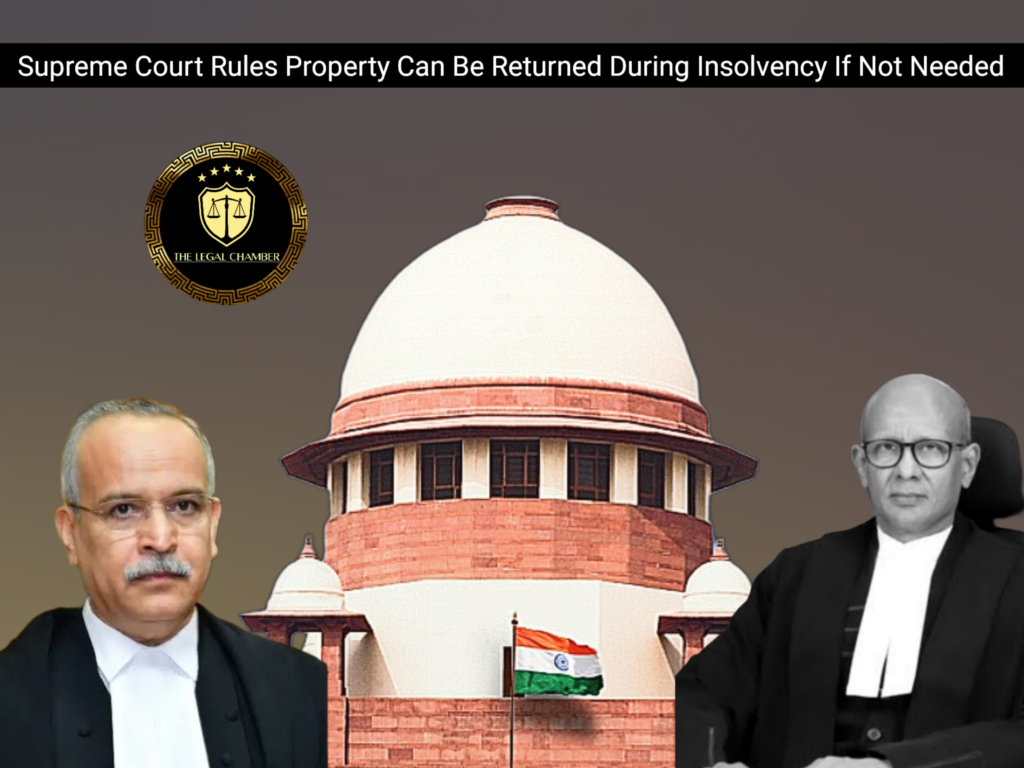
This Supreme Court judgment affirms the paramountcy of the commercial wisdom of the Committee of Creditors (CoC) under the Insolvency and Bankruptcy Code, 2016. It clarifies that the moratorium under Section 14(1)(d) does not bar the return of possession of a corporate debtor’s leased asset when such a decision is a conscious business choice made by the CoC and the Resolution Professional to alleviate a financial burden on the estate.
Facts Of The Case:
The case originated from a dispute over the possession of a property leased by Nandini Impex Private Limited, the corporate debtor. The appellants had provided loans to the company, secured by the title deeds of the property’s front and rear portions. Following a default, the property was conveyed to the appellants through separate deeds in February 2020, but possession was retained by the corporate debtor under simultaneous Leave and License agreements. After the corporate debtor defaulted on rent, the appellants terminated the agreements and initiated eviction suits. Subsequently, the corporate insolvency resolution process (CIRP) was initiated against Nandini Impex upon an application by UCO Bank. The sole member of the Committee of Creditors (CoC), UCO Bank, along with the Resolution Professional, determined that retaining the high-rent property was financially unviable for the insolvency estate and decided to return its possession to the appellants. This decision was initially approved by the NCLT but was set aside on appeal by the NCLAT, which held that the return was barred by the moratorium under Section 14(1)(d) of the IBC, leading to the present appeal.
Procedural History:
The procedural history began when the National Company Law Tribunal (NCLT), Kolkata Bench, by its order dated 07.08.2023, allowed the appellants’ applications and directed the Resolution Professional to deliver possession of the property to them, endorsing the decision of the Committee of Creditors (CoC). This order was challenged by the suspended director before the National Company Law Appellate Tribunal (NCLAT). The NCLAT, vide its impugned order dated 12.11.2024, allowed the appeal, set aside the NCLT’s order, and remanded the matter for fresh consideration, interpreting Section 14(1)(d) of the IBC as a bar to the recovery of possession. This NCLAT order was then appealed to the Supreme Court under Section 62 of the IBC, which culminated in the present judgment, restoring the NCLT’s original order.
READ ALSO :When a Society Becomes a “Trust”: Supreme Court’s Landmark Ruling on Mismanagement in Charitable NGOs
Court Observation:
The Supreme Court observed that the moratorium under Section 14(1)(d) of the IBC is not an absolute bar. It emphasized the paramount status of the commercial wisdom of the Committee of Creditors (CoC). The Court found that the decision to return possession was a conscious business judgment made by the CoC and the Resolution Professional to relieve the corporate debtor from a crippling financial burden, as retaining the high-rent property was unnecessary and unfeasible for the limited operations. This scenario did not constitute a prohibited “recovery by an owner” but was a prudent measure for the insolvency process, thus falling outside the purview of the moratorium’s restrictions.
Final Decision & Judgement:
The Supreme Court allowed the appeal, setting aside the order of the NCLAT. It restored the NCLT’s order dated 07.08.2023, thereby directing the Resolution Professional to deliver possession of the subject property to the appellants. The Court held that the CoC’s commercial decision to relinquish the asset was paramount and that such a surrender, aimed at alleviating a financial burden on the corporate debtor’s estate, did not amount to a prohibited “recovery” under the moratorium prescribed by Section 14(1)(d) of the IBC.
Case Details:
Download The Judgement Here